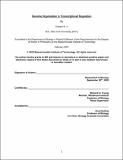Genome organization in transcriptional regulation
Author(s)
Li, Charles H.
Download1251767349-MIT.pdf (36.05Mb)
Other Contributors
Massachusetts Institute of Technology. Department of Biology.
Advisor
Richard A. Young.
Terms of use
Metadata
Show full item recordAbstract
Transcriptional regulation of gene expression plays critical roles in the control of cell identity, development, and disease. Genome organization contributes to transcriptional regulation in multiple ways. At a fundamental level, the genome is organized into distinct active and repressive chromatin states that facilitate transcriptional regulation. These chromatin states are established and maintained at specific genomic regions via the interconnected activities of transcription factors and epigenetic pathways. An additional layer of genome organization is the three-dimensional structure of the genome within the nucleus. Transcriptional regulation occurs within a hierarchy of genome structures that are formed by the activities of structuring factors. Studies described in this thesis identify the transcription factor YY1 as a general structural regulator of enhancer-promoter loops (Weintraub et al., 2017). In recent years, the study of biomolecular condensates has led to a dramatic shift in our understanding of the mechanisms contributing to transcriptional regulation and to genome structure. Distinct chromatin condensates organize the genome by compartmentalizing components associated with transcriptionally active euchromatin and repressive heterochromatin. Whether disruption of chromatin condensates can lead to transcriptional dysregulation in human disease is not well understood. Our finding that MeCP2 is a key component of heterochromatin condensates and that Rett syndrome patient mutations affecting MeCP2 cause condensate disruption (Li et al., 2020), demonstrates a link between chromatin condensate disruption and human disease. These studies reveal important mechanisms of genome organization contributing to transcriptional regulation, and provide new insights into human disease that might be leveraged to provide therapeutic benefit for patients in the future.
Description
Thesis: Ph. D., Massachusetts Institute of Technology, Department of Biology, February, 2021 Cataloged from the official PDF of thesis. "February 2021." Includes bibliographical references.
Date issued
2021Department
Massachusetts Institute of Technology. Department of BiologyPublisher
Massachusetts Institute of Technology
Keywords
Biology.